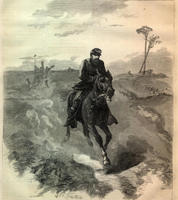 Little Phil has the best chapter titles and subtitles I’ve seen since J.G. Randall’s Lincoln biography: “Sheridan’s Disobedience to Orders,” “Sheridan’s Mendacity,” “A Victorious Campaign Bereft of Decision,” “Little Phil’s Cavalier Destruction of Lives and Careers.”
Little Phil has the best chapter titles and subtitles I’ve seen since J.G. Randall’s Lincoln biography: “Sheridan’s Disobedience to Orders,” “Sheridan’s Mendacity,” “A Victorious Campaign Bereft of Decision,” “Little Phil’s Cavalier Destruction of Lives and Careers.”Eric Wittenberg is here dealing his cards face up on the table. No bluffing, no innuendo. Like the old Army training nostrum, he tells you what he is going to tell you, then he tells you what he wants you to know, after which he tells you what he told you. In this case,
Sheridan was not a great commander of cavalry.The worst restaurant has the longest menu, as experience teaches - but this is a very manageable kitchen.
Sheridan’s performance in the Shenandoah Valley was laxckluster.
Sheridan had a wide streak of insubordination and was not dependable in a subordinate role.
Sheridan tended to prevaricate…
[Those] who drew his ire [were ruined]
Wittenberg is forthright and clear in sticking to this list and I would say he is also economical in making his points prior to appealing to your judgment. Gordon Rhea calls this an “unflinching assessment” and it is somewhat cold where we expect a little authorial bonding with a subject.
But then, Little Phil is not a biography, it is a monograph attempting to correct a record of near universal acclaim: “… he does not deserve the lofty reputation bestowed upon him …”
Does Sheridan hold enough ACW mindshare to be worth this? Can an extended negative demonstration win readers over to a major reassessment? Why write a debunking monograph?
Here’s an answer for you.
When whatever best-selling hack readies his anniversary edition illustrated deluxe leatherette re-issued account of the Third Battle of Winchester, he will have to contend with the arguments raised in Little Phil or look the total fool.
It takes a reputation as big as James McPherson’s to escape the law of self-revision and material self-correction and there is only one James McPherson. The lesser fry cannot get away with McPherson-like avoidance of bad news and contrary views.
Eric Wittenberg has demanded his explanations in a volume widely distributed by a major military publisher, Brasseys, and for the foreseeable future, he will get his explanations or at least an excuse or two, each time someone writes anew about Phil Sheridan.
In that way, his dialog with public history will work for all of us – and that seems eminently worthwhile to me.



